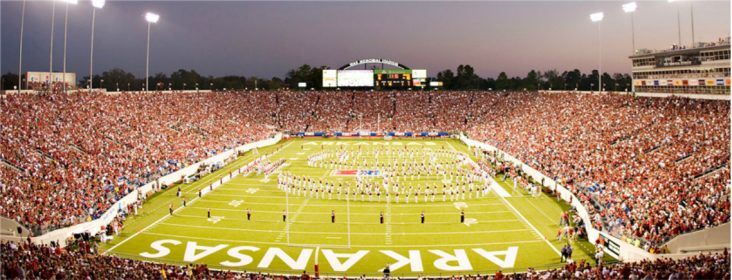Parks and tourism boss provides update on War Memorial Stadium feasibility study
by July 20, 2017 10:14 am 1,958 views

War Memorial Stadium in Little Rock
Arkansas Department of Parks & Tourism (ADTP) director Kane Webb said whether the Arkansas Razorbacks continue to play football games at War Memorial Stadium, the 69-year old venue’s future will remain sustainable.
“We were charged with trying to find more uses for it, with or without a Razorback future,” Webb said. “We hope there is a Razorback future there, but if not, we still have a great facility in a great location. It’s in midtown Little Rock. It’s in the middle of a park. Thousands of people go by it every day. It is an asset.”
In an interview with Northwest Arkansas Business Journal editor Paul Gatling, Webb provided an update on the ADTP’s work with Texas-based consulting firm Conventions, Sports & Leisure International (CSL), which is assisting the department in a feasibility study to determine more and better uses of the stadium.
The state’s contract with CSL runs through April 2018. The War Memorial Stadium Commission, the venue’s governing body, was placed under the purview of the parks and tourism department earlier this year by Gov. Asa Hutchinson, partly to explore ways to help maintain the 69-year-old stadium’s viability. Webb said CSL has extensive experience providing focused research in convention, sport, entertainment and tourism industries.
“They’ve done this all over the world,” he said. “They’ve done the Cotton Bowl. They’ve done work on Reynolds Razorback Stadium [in Fayetteville]. They came up and met with us for the first time recently, to kind of get that [study] going, take a look at the facility, talk to the stakeholders, and see what options there are for uses of the stadium, beyond football. That includes concerts, other events, craft festivals, whatever it may be. Something that can be an attraction almost all the time instead of just for a football game.
“That study will be done in about four or five months, and we’ll have the results of that, and we’ll let the data drive our decisions with it”.
War Memorial Stadium annually hosts high school state championship football games sponsored by the Arkansas Activities Association. But from a larger perspective, the venue is associated for its long-standing relationship with the Razorbacks. That relationship, though, is uncertain. The UA is under contract to play one game at War Memorial this season and one game in the 2018 season. Nothing has been determined after that.
War Memorial has also been in the news recently as a potential home field for the University of Arkansas at Little Rock. The school does not have a football program, but it’s conducting a feasibility study on whether to add one. Webb, who is a Little Rock native, said there has always been community interest in whether UALR could support a football program. The feasibility study will determine if there is interest and if the financial support is there.
“I’ve heard anywhere from $20 to $25 million just to get it off the ground, and another $10 to $12 million to sustain it year-to-year,” he said. “And whether [UALR] can add the women’s sports necessary to meet Title IX requirements; everything that goes into whether or not a university should start a program. It may come back that, no, we would advise against.”
Webb lauded the efforts of UALR Chancellor Andrew Rogerson and athletics director Chasse Conque for letting data drive their decisions.
“Let’s look at the numbers first,” he said. “Let’s see if the community, the city and the school can support this, and then decide whether to move forward. One of the reasons to do this is less than three miles away, you’ve got a stadium. You’ve got War Memorial Stadium, 53,000 seats, and it’s in good shape. It’d be a perfect match. The fact that you don’t have to build a facility like that is a nice first step in itself.”
Watch Webb’s full interview below, including his thoughts on the sale of the Arlington Hotel in Hot Springs, Little Rock’s recent rash of gun violence as a statewide tourism issue and the growth of the mountain biking and motorcycle niche of the state’s tourism economy.
